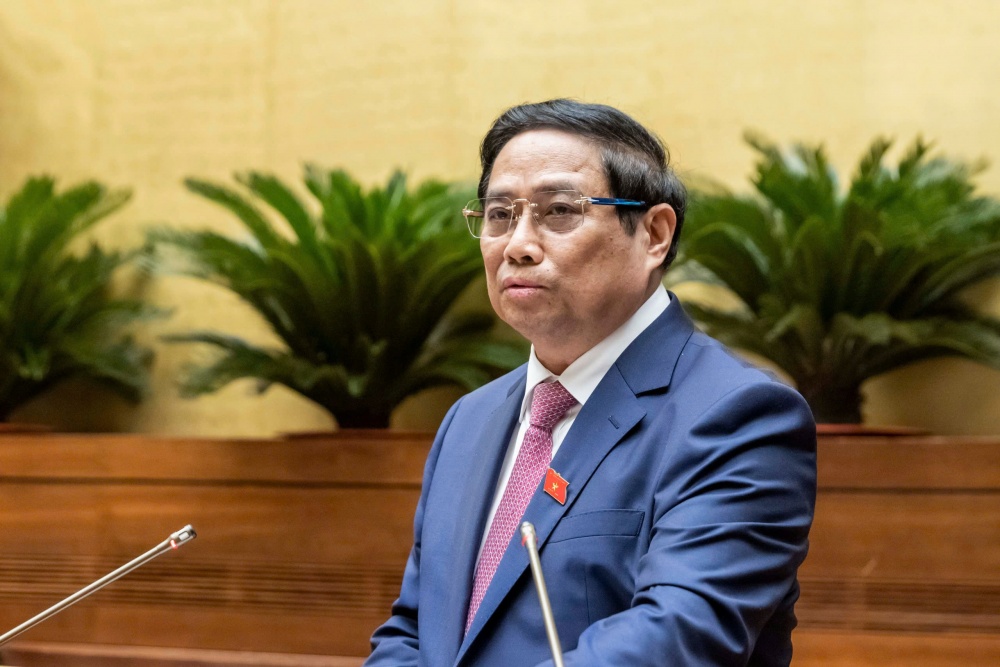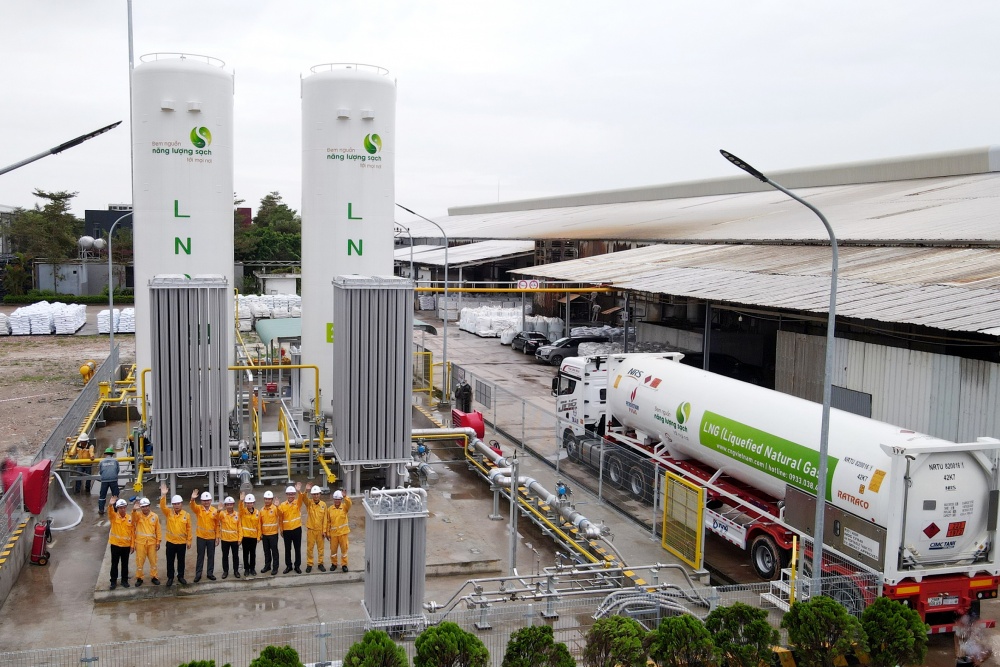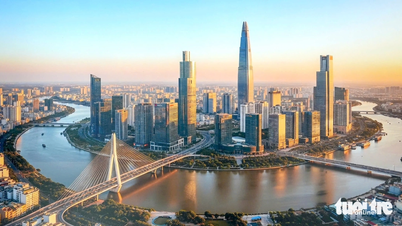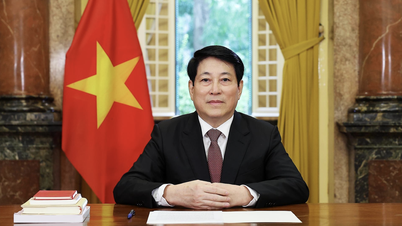Reporting on the results of the implementation of the 2024 socio -economic development plan; the expected 2025 socio -economic development plan at the 8th Session of the 15th National Assembly, Prime Minister Pham Minh Chinh said that 2024 marks a remarkable development step of the Vietnamese economy when GDP is estimated to reach 6.8 - 7%, exceeding the target set by the National Assembly.
| Standard Chartered raises 2024 GDP growth forecast to 6.8% Businesses make important contributions to economic growth |
 |
| Prime Minister Pham Minh Chinh speaks at the 8th Session of the 15th National Assembly |
Economic growth higher than expected
The Prime Minister said that 2024 marks a challenging period but also brings many successes for Vietnam in the process of socio-economic development. In the context of the world facing complex and unpredictable fluctuations, from armed conflicts, geopolitical tensions to global economic recession, Vietnam has strived to overcome and achieved positive results, affirming its position in the region and the world.
Despite being affected by the global situation, Vietnam’s economy has maintained its growth momentum and macroeconomic stability. These results are not only a testament to the strong leadership of the Party and Government, but also reflect the spirit of solidarity and resilience of the entire nation in coping with difficulties and challenges.
In 2024, Vietnam's GDP is estimated to grow by 6.8 - 7%, higher than the target of 6.0 - 6.5% set by the National Assembly. This result puts Vietnam in the group of countries with the highest economic growth rate in the region and the world. This is all the more remarkable when Vietnam is facing major challenges such as strong fluctuations in oil and basic goods prices, a decline in global aggregate demand, and the impacts of natural disasters and climate change.
During the first 9 months of 2024, the economy continued to have positive changes, with each quarter higher than the previous. Vietnam maintained macroeconomic stability, controlled inflation and ensured major economic balances. This helped strengthen investor confidence and promote the recovery of the labor market, creating favorable conditions for growth in economic sectors.
In addition, inflation was well controlled with the average consumer price index (CPI) increasing by 3.88% in the first 9 months. This is a remarkable achievement in the context of the basic salary being adjusted up from July 1, 2024. The Government has maintained the stability of the foreign exchange market, lowered interest rates to support economic growth and maintained a stable exchange rate. These macroeconomic policies have created favorable conditions for the Vietnamese economy to maintain stability in a challenging period.
State budget revenue in the first nine months of the year reached 85.1% of the estimate, up 17.9% over the same period last year. The government has also exempted and extended nearly VND200,000 billion in taxes, fees and charges to support businesses and people to overcome difficulties.
At the same time, import and export achieved a large trade surplus. Import and export turnover in the first 9 months reached 578.5 billion USD, up 16.3% over the same period in 2023. By October 15, 2024, the total import and export turnover had reached 610.5 billion USD, with a trade surplus of nearly 21.24 billion USD. This achievement further affirms Vietnam's role as an open economy, with deep international integration and is taking advantage of opportunities from free trade agreements that Vietnam has signed.
Public investment and foreign direct investment (FDI) attraction have both achieved remarkable results. Public investment focuses on key projects, with the spirit of "surviving the sun and rain, not losing to storms" and the goal of completing 3,000 km of expressways. These projects not only help improve infrastructure but also create momentum to promote sustainable economic growth.
FDI disbursement in 2024 reached 17.3 billion USD, up 8.9% over the same period last year, the highest in many years. This strong growth shows that Vietnam is still an attractive destination for foreign investors, especially in the context of declining global investment. Sectors such as manufacturing and processing industry, digital economy and green economy are bright spots attracting foreign investment.
Despite many achievements, the Prime Minister also frankly acknowledged that the Vietnamese economy still faces challenges that need to be overcome. First of all, macroeconomic stability still has many potential risks. Production and business activities are still facing difficulties due to high production costs and signs of slowing domestic purchasing power. Disbursement of public investment capital is still slow, affecting the progress of completing a number of key infrastructure projects.
Some credit programs are being implemented slowly, making it difficult for many businesses to access capital to develop production. Bad debt is on the rise, along with a high volume of corporate bonds maturing in 2024, creating additional pressure on the financial system.
In addition, there are many shortcomings in the management of public assets and land, leading to great waste. Compensation, site clearance and resettlement are still prolonged, affecting the progress of many large projects. Smuggling and trade fraud continue to be complicated, posing challenges in economic management.
Strive to achieve a higher growth rate in 2025, from 7 - 7.5%
Prime Minister Pham Minh Chinh also emphasized that 2025 is of special significance, marking many major historical events such as the 95th anniversary of the Party's founding, the 50th anniversary of the liberation of the South and national reunification, and the 80th anniversary of the founding of the country. This is also the final year of the 5-year socio-economic development plan 2021 - 2025. In that context, the Government has set specific development goals to continue to promote growth and improve the quality of life for the people.
 |
| The first LNG station in the North is put into use in Bac Ninh |
The general target for 2025 is GDP growth of about 6.5 - 7%, striving to achieve a higher growth rate of 7 - 7.5%, aiming to bring Vietnam into the top 31 - 33 largest countries in the world in terms of GDP scale. GDP per capita is expected to reach 4,900 USD by the end of 2025. The proportion of manufacturing and processing industry in GDP will reach about 24.1%, with a growth rate of social labor productivity reaching 5.3 - 5.4%.
The government also set a target of controlling inflation below 4.5% and unemployment rate in urban areas below 4%. Vietnam aims to develop a sustainable economy, enhance digital transformation, develop a green and circular economy, while continuing to reform institutions, improve competitiveness and develop key industries...
To achieve the set goals, the Government has identified 11 key groups of solutions to be implemented in 2025. Regarding promoting economic growth, the Government will continue to renew traditional growth drivers such as investment, consumption and export, while strongly developing new growth drivers such as digital economy, green economy and circular economy. Public investment will be promoted from the beginning of the year, focusing on national construction projects with inter-provincial, inter-regional and international connectivity.
Regarding maintaining macroeconomic stability, the Government will operate monetary policy flexibly, promptly and effectively, closely coordinating with fiscal and other policies to ensure inflation control, maintain exchange rate stability and improve credit quality. Credit growth in 2025 is targeted at over 15%.
Regarding institutions and administrative reforms, the Government will continue to reform administrative procedures and cut unnecessary regulations to create a favorable investment and business environment. The Government will promote decentralization and improve the efficiency of resource use.
Regarding the completion of key infrastructure systems, the Prime Minister said that 2025 will be a pivotal year for implementing many important infrastructure projects such as highways, Long Thanh International Airport and renewable energy projects. The Government will also focus on solving issues related to site clearance and ensuring the supply of raw materials to ensure the progress of projects.
Regarding the development of high-quality human resources, the Government will focus on training human resources for high-tech industries, especially in the fields of semiconductors and artificial intelligence. The goal is that by 2025, Vietnam will be among the top 3 ASEAN countries in the global innovation index.
Regarding promoting digital transformation and green economic development, digital transformation will continue to be a top priority with the goal of comprehensively digitizing state management and socio-economic activities. Vietnam will also step up the implementation of action programs on green development and emission reduction, aiming for net zero emissions by 2050.
In addition, the Government will continue to promote foreign affairs and international integration, not only to protect territorial sovereignty but also to attract resources for economic development. Economic and cultural diplomacy will be important pillars in Vietnam's foreign policy strategy.
Source: https://thoibaonganhang.vn/nhung-giai-phap-dot-pha-cho-tang-truong-ben-vung-156928.html





































































































Comment (0)